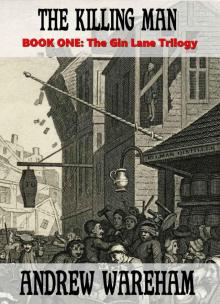- Home
- Andrew Wareham
Long Way Place (Cannibal Country Trilogy, Book 1) Page 2
Long Way Place (Cannibal Country Trilogy, Book 1) Read online
Page 2
“Then tell the police! Surely…”
“They knows, lady, and can’t do nothing. The ordinary coppers want to, I reckons, but there ain’t nothing they can do. Too bloody much money for them to argue with, lady.”
“And too many powerful men, I expect… All the trouble in the world is made by men! What’s your name?”
“Hawkins, ma’am.”
“Right, Mr Hawkins – have you got the girls’ birth certificates?”
“Didn’t know there was any, ma’am.”
“Every child should be registered at birth, so that their age is recorded. I am much afraid that you are mistaken, Mr Hawkins, your sisters are at least twelve years old, small for their age. You understand me?”
He did, almost burst into tears, to his own horror.
“Bring them here tomorrow morning. There is a ship next Monday and two more can go on it, with a little attention to the paperwork. They will stay in our hostel over the weekend, and I will organise all that we need – it will be a rush, especially to get the certificate that they are free of consumption. Twins, we will need to keep them together – that can be done. Well, what are you waiting for, Mr Hawkins? You must have work to do, I should hope – you have certainly given me a lot. Tomorrow at nine o’clock precisely, sir!”
She chased him out, cutting short his thanks – she did not need them, she said.
The girls did not want to go – they had never been as much as a mile away from home, had no wish to travel foreign as far as Pompey or beyond. Even more, they thought it would be wrong to leave him on his own, with nobody to care for him, to look after him. He promised that he would not stay alone for long, that he would find a friend of his own. In any case, he did not intend to stay in Southampton, he would soon be gone, probably he would follow them to Canada. It was a lie, but it quietened their consciences. He would have said anything to get them to go, having once decided it was the best thing for them, and the only way to keep the promise he had made to himself, to keep them safe. They went with him next morning, holding hands and a paper bag that contained their spare underclothes and the single rag doll that went to bed with them.
The Society gave Ned a pass to enter the New Docks on Monday, and he stood on the quayside and waved as they hung over the stern railings and screeched to him and promised to write.
He never saw them again and any letters they sent never caught him up.
On his own and with no responsibilities Ned found life very easy, almost enjoyable. He could live on the takings of a single foray into the docks each week – the corned beef store seemingly ever full for him. Quite inevitably, he grew careless and a little greedy. He dropped off the train by a warehouse new to him, climbed to its roof and found a ventilation stack with wooden louvers that could be slipped out and replaced in seconds. It was a bonded store and he left with twenty-eight pounds of pipe tobacco in one-ounce packets. The corner shop gave him two pounds in half-crowns, less one for his rent, and promised to take all he could supply. On his fourth visit in the week he slipped quietly down the fire-ladder and was gripped very tightly by a large, strong hand, was marched to the front of the building, into the arc-lights.
“And what have we in that bag, Neddy-me-boy?”
“Pipe tobacco, Sergeant Evans.” There was no point in lying or staying silent.
Stationed at St Mary’s, and the local copper with a deep knowledge of his patch, Sergeant Evans had watched Ned for years, but had never caught him before. He had some degree of liking for the boy, in fact – he was never foul-mouthed and lacked the casual violence and vice so common in his guttersnipe contemporaries.
“Corned beef is one thing, Neddy – and I heard the whisper about that weeks ago! But tobacco is something else! Feeding your sisters is no great sin … but, talking of that, where are they now, Neddy? I ain’t seen them going to school lately. What has become of them, boy?”
Sergeant Evans knew of Mrs Pink’s as well, and the suspicion was harsh in his voice. There would be no mercy in him if the girls had gone there.
“They ain’t home no more, Sergeant Evans. You knows the Society, up by the Bar Gate? They took ‘em off to Canada, five weeks ago last Monday. I couldn’t look after ‘em. I knew what was goin’ to ‘appen – well, it ain’t now – they’re safe. Even if they didn’t want to go and cried.”
“I never thought of that, boyo, or I would have suggested it myself, knowing how you looked after them. You did very well there, young Neddy, very well indeed.” The sergeant turned to the warehouse manager, stood with the tobacco in his hand. “Mr Smithers, do you wish to prosecute, or would you leave this with me?” He put his hand on his heavy leather belt, made as if to take it off.
“Sounds as if there might be some good in him, Sergeant. A good hiding would be better for him than going to prison – just so long as I don’t see him here again!”
“Thank you, sir – I do not believe he will repeat his error.”
A few indrawn breaths amongst the hands watching suggested they felt the same, had some sympathy for the skinny little lad in front of them. The sergeant gripped Ned’s ear, led him off towards the gate, round a bend behind the next row of warehouses.
“Right, we’re out of sight now, boyo.”
The sergeant clasped his hands behind his back, marched along beside Ned. “Don’t look so bloody nervous, boy – the belt was to keep those silly buggers satisfied, that’s all. I want you out of Southampton, Neddy, because, if you stay here, you will be in prison before the year’s out, and that would be a waste, would it not?”
“I don’t want to go down, Sergeant Evans, but I got to eat.”
“I could have a word at the agency in the morning, and you would be aboard ship by end of the week. Black gang, that’s all it would be, but you could put a few bob together over two or three years, then pay off in America or South Africa and make a life for yourself in the colonies. Failing that, it’s the London train for you, Neddy – you can buy a ticket, I expect – you’ve been in there a half dozen times, I calculate.” He nodded over his shoulder at the bonded store. Ned grinned, said nothing.
“Well, boyo?”
“I don’t know nobody in London, Sergeant Evans. What time do we go to the agency?”
The sergeant, a massive six-footer, ex-Brigade of Guards, was beset by sudden doubt.
“You’re still a bit young and skinny for the stoke-hold, boyo – might stunt your growth for always. It might be better you stayed in England a year or two longer yet. How would you like to be a garden boy, Neddy? Working outdoors at a big house near Winchester, it would be, if they takes you on. We get circulars come round from some charity, every so often – places for ‘deserving young boys who wish to live a clean, rural existence’. Mostly it’s just a way of getting servants for pennies, so we don’t have anything to do with it at our station. The two lads we sent to them both ran away in weeks – but it might be just the thing for you for a year or so. Outdoor work; good food… well, plenty of it, anyway; healthy fresh air. Put some flesh on your bones and learn a bit about gardening and the land. A bit of a trade – be useful in South Africa or Canada or America. What do you say? Do you want me to try?”
Ned was surprised to discover he had a choice in the matter, had expected to be given his orders. He thought for a few seconds. Black gang work was hard and generally poorly paid. There was no point in going to the slums of another town in England. He could go across to Pompey, he had heard, and join the navy there, but he would probably end up as a stoker, just as badly paid as in the merchant service. He might be able to join the Colours, become a soldier, and get sent to South Africa for them Boers to shoot his head off, but he was probably too short to be taken on, anyway.
“Yes, please, Sergeant Evans. I thinks it might be a good idea for a year, or thereabouts. Do I have to stay if I can’t stand it?”
“Six months, at least – give it a fair crack, boy. Your word on that?”
“I promise, Sergeant Eva
ns.”
“Right. Go home and pack up anything you want to go with you. I will see you this afternoon, I expect.”
The sergeant returned to St Mary’s station and filed a brief report that the complaints of theft at the bonded store had been settled. Then he sent a telegram to Mrs Colonel Chalmers at Valley House in Micheldever, enquiring whether there was still a vacancy for a young garden boy, received confirmation that there was and his candidate should be sent as soon as possible, a cheque for two pounds would be remitted to the station fund immediately. He withdrew two pounds against his inspector’s signature, went to find Ned, led him down St Mary’s Street to the shops, to buy new, not second-hand. Ned had never bought clothes that way before, was rather pleased at the prospect.
Brown boots for work and a pair of black for best; six pairs of thick woollen socks; six pairs of flannel liners for the two pairs of heavy working corduroy trousers; six shirts, collarless, flannel; a muffler; a working cap; a thick jacket for winter. Each item would be worn for two working days, so he was outfitted for a fortnight at a time, could wear his own clothes on Sundays.
“Two bob left, boyo – a leather waistcoat, or a thick woolly jumper?”
“Could I ‘ave both, Sergeant Evans? I got a couple of bob of me own.”
“Have you now! And I wonder where you got that, young Neddy! As if I needed to ask! Go on, use it!”
Ned packed his one small bag that evening, put in his clothes and the razor he had bought the previous year. He had nothing else. He tucked the bag away behind the door and wandered off into the darkness, making towards the Juniper Berries, behind the old walls over on the New Docks side, one of the roughest pubs in Southampton. There was a darts match and Dave from Mrs Pink’s was playing – he was one of the best in the whole area, never missed his game. Ned’s way took him past a building site and he hopped over its fence, selected a putlog from the stack of scaffolding poles – one of the short cross-members, a piece of timber four inches in diameter and five feet long. He made his way across the park and round by the old walls, found an alleyway within sight of the doors of the Berries, settled back to wait in the dark.
Dave would leave as soon as the match finished, would have to be at work before the evening was over. He normally walked out on his own, a big man, unafraid of the dark streets. Ned had considered taking a club to him before, but he knew he would not have been able to stay on in Southampton afterwards if he had left him alive, and he had been unwilling to take the risks of a murder. Now he was free of constraint. He watched quietly, hardly thinking of anything, just keeping alert.
The door opened and a single large figure emerged, called something back over his shoulder, turned down the road towards Ned’s hiding place. It was Dave, on his own – if he had had company Ned would have left – he wasn’t that important. The big man walked past, hardly smelling of beer, he drank very little when he was due to go to work. Ned stepped forward and swung, solidly across his head, dropped him cold. Two minutes with boot and club and he had broken both legs and half of his ribs. Ned dropped the putlog and walked silently away – perhaps some other little girls would be safer now.
Sergeant Evans put him on the train to Micheldever the next morning, shaking hands formally, saying farewell and hoping never to see him back in Bevois Valley again. He wished him luck as the three carriage local train pulled out; left Ned sat inside a train for the first time in his life.
Micheldever station was a quarter of an hour past Winchester, located in a chalk cutting in the Downs, a large marshalling yard and sidings in the middle of nowhere. Ned got out, stood on the up platform, puzzling out where to go next. There was a porter in uniform and he asked him if he knew where Valley House was.
“Out the gate, turn left, up the lane, better part of a mile uphill. There’s a driveway on the right hand side, with a sign saying Valley House on it. The house is out of sight, down slope a bit, behind the trees.”
“Right, thanks. Why’s this station so big, mister? There ain’t no town ‘ere, is there?”
“Army, young man. Small arms ammunition and artillery shells, in the warehouses against the cuttings, over the other side. They make the trains up here to go down to the docks for loading directly aboard ship. You don’t want to store this stuff down at the quayside!”
“Yeah, I didn’t think about that. Make a hell of a bang if anything went wrong, wouldn’t it.”
A mile uphill, carrying his bag, wearing his old comfortable boots, luckily. The road, unsurfaced and rutted, showing bare chalk over much of its topping, would be slippery, almost impassable in deep winter, he guessed. He shrank into his coat as he walked out into the open, past the last of the few cottages that made up this end of the village. It was open, empty, bare – bigger than the park a hundred, a thousand times over – he had never seen so much wasted space without proper houses on it, but he had never been out of town before. It made him feel small, and he wasn’t very big to start with. He watched the side of the road carefully – he wasn’t sure just how long a mile was, did not want to end up walking on and on, for ever and ever, night coming down on him lost in this desert. Twenty minutes, more or less, he thought, and there was a gravelled driveway and a discreet sign, turning downhill, a belt of trees across the slope of the Down, just as the porter had said. He marched in. Ten more minutes and the house came in sight. The land surrounding it was pretty rough, he thought, recognising brambles and stinging nettles, both growing in profusion.
It was a big house, red brick, quite modern – he had seen bigger buildings in Southampton, plenty of them, was not too impressed. A front door, eight windows on either side of it, three floors high – it was a lot for just one family! Better not to use the front door – the drive was rutted more heavily round to the right, so that seemed the best way to go. He found the tradesman’s entrance, knocked timidly, stepped back as a woman in white appeared, wrathful, arms crossed over a massive bosom, voice raised in outrage.
“Leg of lamb indeed! Mutton! And not the best of that! If you want to keep the trade of this house, you can tell Mr Richards to do better than … you’re not the butcher’s boy! Who are you? Why are you here?”
He found himself with his cap in his hand, begging her pardon in a very little voice, would have been indignant, if he had dared.
“I’m Ned Hawkins, ma’am, if you please. Sergeant Evans sent me here to be the garden boy, if you don’t mind, ma’am.”
She stared at him, inspected him from head to toes, sniffed.
“Well, you look clean, at least. Wait there, I shall tell madam.”
She returned in five minutes, bade him go round to the front door and be patient.
“Madam does not use the tradesman’s entrance.”
The door opened after a very short wait and a tall lady, vaguely blonde and fortyish, stood on the top step and surveyed him.
“Edward Albert Hawkins.”
“Yes, ma’am.”
“How old are you, Hawkins?”
“Fourteen, I think, ma’am.”
“You are not very big for your age, Hawkins – we must feed you up, I think. There is a lot of work to do, Hawkins, for the gardener went to the Colours with the colonel. They are both in South Africa now. Go round the back, Cook will show you where you are to sleep and eat and wash. In the morning she will show you where the tool shed is, and tell you what to do. She runs the house for me, now, until the menfolk come back.”
Cook ran the house, and everybody in it, ruthlessly fair. Provided she was obeyed instantly she had no problems at all, and neither did anyone else, including Mrs Colonel. She showed Ned to a tiny room at the back of the kitchens, near the side door. Then she pointed him to his own wash place and informed him that the attics and upstairs bathroom were for female staff – exclusively! She did not tell him what would happen if he was ever found upstairs, and he lacked the extreme bravery to ask. His meals would be taken at the kitchen table, she told him, not in the servants’ hall, again a femal
e enclave. He would eat within five minutes of the bell ringing, or do without, breakfast, lunch and dinner. There might be a supper available, if he was good, sometimes – it was not a covenanted meal. The tea pot would be hot at each meal time, and maybe at other times on very cold days. His laundry would be done for him – it would be placed in the basket first thing on Mondays, and she would expect to find a week’s working clothing there, each week. He would polish his boots himself – this was a soldier’s house and there was polish and cleaning rags in plenty - and not track mud on her floors, not if he knew what was good for him. Was all clear? Good. He might sit by the fire in the kitchen of an evening. There would be one candle a week for his room.
He understood, took his bag into his room, unpacked it very neatly, hung up his coat, put everything else away in the small chest of drawers. He inspected the bed – a real iron bed, not just a thin mattress on the floor. It had sheets, top and bottom, and four blankets, thick and woollen, and a patchwork quilt to go on top. There was a pillow, not a folded coat. It was the best he had ever seen. There was a towel in his wash place, and two taps at the basin – experiment showed that one ran with hot water. There was a flush lav as well, with a chain – he had heard of them, never actually seen one before. He was in clover, except that he was on his own – he had got used to home comforts from Lizzie, and it sounded very much as if that was not going to happen here. No matter, that was life.
There was a meat stew for evening meal – ‘dinner’, he was told - and bread and cheese for supper. In the morning there was porridge and fried bread and two eggs. He was called in at the middle of the day – ‘luncheon’ – boiled bacon and spuds and greens. He had never eaten so well in his life. The bacon was fat back, the meat in the stew tough and gristly, but it was more than he had ever had before, and better cooked. There would be a pudding on Sundays, Cook told him – he looked forward to that, he had never eaten pudding before.

 A Killing Too Far
A Killing Too Far Killing's Reward
Killing's Reward A New Place
A New Place The Killing Man
The Killing Man Bold and Blooded
Bold and Blooded The Breaking Storm (Innocent No More Series, Book 2)
The Breaking Storm (Innocent No More Series, Book 2) Nobody’s Child
Nobody’s Child 04 Peking Nightmares (The Earl’s Other Son Series, #4)
04 Peking Nightmares (The Earl’s Other Son Series, #4) Red Man
Red Man Foreign Mud
Foreign Mud The Gathering Clouds (Innocent No More Series, Book 1)
The Gathering Clouds (Innocent No More Series, Book 1) 06 A Soldier’s Farewell (Man of Conflict #6)
06 A Soldier’s Farewell (Man of Conflict #6) Chinese Whispers
Chinese Whispers 02 Shanghai Dreams (The Earl’s Other Son #2)
02 Shanghai Dreams (The Earl’s Other Son #2) Hungry Harry: An Orphan in the Ranks
Hungry Harry: An Orphan in the Ranks A Wretched Victory (Innocents At War Series, Book 6)
A Wretched Victory (Innocents At War Series, Book 6) Illusions Of Change (A Poor Man at the Gate Series Book 6)
Illusions Of Change (A Poor Man at the Gate Series Book 6) The Wages Of Virtue (A Poor Man at the Gate Series, Book 8)
The Wages Of Virtue (A Poor Man at the Gate Series, Book 8) Blood and Famine (Man of Conflict Series, Book 4)
Blood and Famine (Man of Conflict Series, Book 4) The Friendly Sea (The Duty and Destiny Series, Book 1)
The Friendly Sea (The Duty and Destiny Series, Book 1) Bursting Balloons (Innocents At War Series, Book 5)
Bursting Balloons (Innocents At War Series, Book 5) The Death of Hope
The Death of Hope Deadly Shores (The Duty and Destiny Series, Book 11)
Deadly Shores (The Duty and Destiny Series, Book 11) The Vice Of Virtue (A Poor Man At The Gate Series Book 10)
The Vice Of Virtue (A Poor Man At The Gate Series Book 10) Virtue’s Reward (A Poor Man at the Gate Series, Book 11)
Virtue’s Reward (A Poor Man at the Gate Series, Book 11) A Deadly Caper (Innocents At War Series, Book 2)
A Deadly Caper (Innocents At War Series, Book 2) The Pain Of Privilege (A Poor Man at the Gate Series Book 4)
The Pain Of Privilege (A Poor Man at the Gate Series Book 4) Far Foreign (The Duty and Destiny Series, Book 9)
Far Foreign (The Duty and Destiny Series, Book 9) Shores of Barbary (The Duty and Destiny Series, Book 12)
Shores of Barbary (The Duty and Destiny Series, Book 12) The Odd-Job Man (The Duty and Destiny Series, Book 7)
The Odd-Job Man (The Duty and Destiny Series, Book 7) Fire and Folly (Man of Conflict Series Book 3)
Fire and Folly (Man of Conflict Series Book 3) A Victorian Gent (The Making of a Man Series, Book 1)
A Victorian Gent (The Making of a Man Series, Book 1) Sugar and Spice (The Duty and Destiny Series, Book 6)
Sugar and Spice (The Duty and Destiny Series, Book 6) Dark Days Of Summer (Innocents At War Series, Book 4)
Dark Days Of Summer (Innocents At War Series, Book 4) Dire Shenanigans (The Making of a Man Series, Book 2)
Dire Shenanigans (The Making of a Man Series, Book 2) The Fuzzy-Wuzzy Man (The Duty and Destiny Series, Book 3)
The Fuzzy-Wuzzy Man (The Duty and Destiny Series, Book 3) Privilege Preserved (A Poor Man at the Gate Series Book 5)
Privilege Preserved (A Poor Man at the Gate Series Book 5) No Longer A Game (Innocents At War Series, Book 3)
No Longer A Game (Innocents At War Series, Book 3) An Uncertain Peace (The Making of a Man Series, Book 3)
An Uncertain Peace (The Making of a Man Series, Book 3) Fortune And Glory (The Duty and Destiny Series, Book 5)
Fortune And Glory (The Duty and Destiny Series, Book 5) The Old Order (A Poor Man at the Gate Series Book 7)
The Old Order (A Poor Man at the Gate Series Book 7) A Place Called Home (Cannibal Country Trilogy, Book 2)
A Place Called Home (Cannibal Country Trilogy, Book 2) Nouveau Riche (A Poor Man at the Gate Series, Book 2)
Nouveau Riche (A Poor Man at the Gate Series, Book 2) The Privateersman (A Poor Man at the Gate Series Book 1)
The Privateersman (A Poor Man at the Gate Series Book 1) Britannia’s Son (The Duty and Destiny Series, Book 4)
Britannia’s Son (The Duty and Destiny Series, Book 4) Long Way Place (Cannibal Country Trilogy, Book 1)
Long Way Place (Cannibal Country Trilogy, Book 1) Spanish Tricks (Man of Conflict Series, Book 5)
Spanish Tricks (Man of Conflict Series, Book 5) A Parade Of Virtue (A Poor Man At The Gate Series Book 9)
A Parade Of Virtue (A Poor Man At The Gate Series Book 9) A Busy Season (The Duty and Destiny Series, Book 8)
A Busy Season (The Duty and Destiny Series, Book 8) Billy Bacon and the Soldier Slaves (Colonial Warrior Series, Book 1)
Billy Bacon and the Soldier Slaves (Colonial Warrior Series, Book 1) Raging Rajahs (Man of Conflict Series, Book 2)
Raging Rajahs (Man of Conflict Series, Book 2) Victorian Dawn (A Poor Man at the Gate Series, Book 12)
Victorian Dawn (A Poor Man at the Gate Series, Book 12) Born To Privilege (A Poor Man at the Gate Series Book 3)
Born To Privilege (A Poor Man at the Gate Series Book 3) The Soldier Brat (Man of Conflict Series, Book 1)
The Soldier Brat (Man of Conflict Series, Book 1)